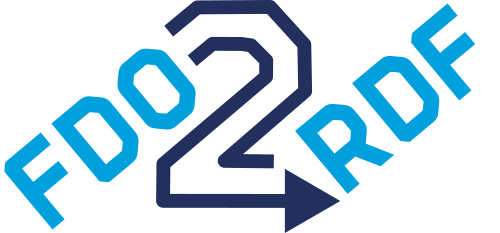 This tool converts FAIR digital objects metadata in JSON into RDF triples using Simple Standardized Ontology Mappings (SSSOM) for mapping subject identifiers to object identifiers (RDF predicates).
FDO2RDF processes the input JSON data, applies SSSOM mappings (either provided as a file on the local file system or a URL), and outputs the data in Turtle (`.ttl`) format.
It simplifies metadata transformation and supports integration with semantic web platforms, including the Helmholtz Knowledge Graph.
This tool converts FAIR digital objects metadata in JSON into RDF triples using Simple Standardized Ontology Mappings (SSSOM) for mapping subject identifiers to object identifiers (RDF predicates).
FDO2RDF processes the input JSON data, applies SSSOM mappings (either provided as a file on the local file system or a URL), and outputs the data in Turtle (`.ttl`) format.
It simplifies metadata transformation and supports integration with semantic web platforms, including the Helmholtz Knowledge Graph.
- Convert JSON to RDF: The main function of FDO2RDF is to convert FDO metadata in JSON into RDF triples using mappings from an SSSOM file.
- Flexible Input and Output: allows you to specify input files for both the JSON data and the SSSOM mapping, as well as the output RDF file.
- Turtle Format: outputs RDF triples in Turtle (
.ttl) format. - SSOM mappings: Process the provided mappings file in TSV, either as a file on the local file system or a URL.
- Python 3.x: The tool is compatible with Python 3.
- Required Libraries:
pandas: for reading and processing the SSSOM file.rdflib: for creating and manipulating RDF graphs.argparse: for handling command-line arguments.requests: for handling HTTP requests.
You can install fdo2rdf directly from the source:
git clone https://github.com/Materials-Data-Science-and-Informatics/FDO2RDF.git
cd FDO2RDF
pip install .
To run the tool, you can use the following command:
fdo2rdf --json 'src/fdo2rdf/samples/sample-FDO.json' --mappingsFile 'src/fdo2rdf/mappings/Helmholtz-KIP-mappings.tsv'You can either specify the output file using the --output parameter, or it will be automatically generated into the local directory as FDO-triples.ttl.
-
--json
- Description: Specify the path to the input JSON file.
- Required: Yes
-
--mappingsFile
- Description: Provide the URL or path to the SSSOM mapping file (in TSV format).
- Required: Yes
-
--output
- Description: Specify the path to the output RDF Turtle file.
- Required: No
-
--version
- Description: Print the version of the tool.
- Required: No.
-
--help
- Description: Show the help message with all available arguments.
- Required: No.
The input is a JSON file which is structured as a list of objects representing FDO metadata:
pid: The Persistent Identifier (PID) for the record, which will be converted to a URI.record: A list of key-value pairs, where:key: A CURIE subject identifier (e.g.,schema:name).value: A literal value associated with the subject.
Example:
{
"pid": "https://hdl.handle.net/21.11152/6ea60288-d895-414e-80c0-26c9fdd662b2",
"record": [
{
"key": "https://hdl.handle.net/21.T11148/397d831aa3a9d18eb52c",
"value": "2022-08-19T00:00:00+00:00"
},
{
"key": "https://hdl.handle.net/21.T11148/82e2503c49209e987740",
"value": "{ \"md5sum\": \"f133dd7d1faacf15a434e2e8ece0d57b\" }"
},
{
"key": "https://hdl.handle.net/21.T11148/c692273deb2772da307f",
"value": "1.0.0"
},
{
"key": "https://hdl.handle.net/21.T11148/aafd5fb4c7222e2d950a",
"value": "2022-08-19T00:00:00+00:00"
}
]
}
The SSSOM mapping file should be in TSV (tab-separated values) format, with two key columns:
subject_id: The CURIE subject identifier (e.g.,schema:name).object_id: The corresponding RDF predicate URI.
Example:
#curie_map:
# hdo: https://purls.helmholtz-metadaten.de/hob/HDO_
# schema: https://schema.org/
# hdl: https://hdl.handle.net/
# provo: http://www.w3.org/ns/prov#
subject_id subject_label predicate_id object_id object_label mapping_justification author_id mapping_date
hdl:21.T11148/c085f1292d7d4a338d96 wasGeneratedBy skos:broadMatch provo:wasGeneratedBy wasGeneratedBy semapv:ManualMappingCuration https://orcid.org/0000-0002-4366-3088 2023-03-03
hdl:21.T11148/076759916209e5d62bd5 kernelInformationProfile skos:exactMatch hdo:00006065 follows kernel information profile semapv:ManualMappingCuration https://orcid.org/0000-0002-2818-5890 2025-01-31
hdl:21.T11148/1c699a5d1b4ad3ba4956 digitalObjectType skos:exactMatch hdo:00006080 has digital object type semapv:ManualMappingCuration https://orcid.org/0000-0002-2818-5890 2025-01-31
hdl:21.T11148/29f92bd203dd3eaa5a1f dateCreated skos:exactMatch schema:dateCreated dateCreated semapv:ManualMappingCuration https://orcid.org/0000-0002-2818-5890 2025-01-31
- Extract CURIE Prefixes: The tool extracts CURIE prefixes and their corresponding full URIs from the provided SSSOM file.
- Parse SSSOM Mapping: The tool maps the
subject_idfrom the input JSON to the correspondingobject_id(predicate) based on the SSSOM mappings. - Convert JSON to RDF: The tool creates an RDF graph where each JSON object is translated into RDF triples, using the extracted CURIE prefixes for URIs and literals for values.
- Output Turtle File: The resulting RDF graph is serialized into Turtle format and saved to the specified output file.
The output RDF will be saved in Turtle format, which will look like this:
@prefix hdo: <https://purls.helmholtz-metadaten.de/hob/> .
@prefix schema: <https://schema.org/> .
<https://hdl.handle.net/21.11152/6ea60288-d895-414e-80c0-26c9fdd662b2> hdo:HDO_00006065 "21.T11148/b9b76f887845e32d29f7" ;
hdo:HDO_00006068 "http://vocabularies.unesco.org/thesaurus/concept1557",
"http://vocabularies.unesco.org/thesaurus/concept3052" ;
hdo:HDO_00006070 "21.11152/041a6111-644a-4617-afb3-3c421a88e8e3",
"21.11152/365fd8cf-8e86-41b8-9d0e-b816fdd01d29",
"21.11152/3ab9f444-05f6-445e-a691-62fae4021bea",
"21.11152/6858a0b5-cc60-40e9-afef-8c2dd8b35e8e",
"21.11152/e670f510-7e00-4d3a-9b90-3bac7a7c069e" ;
hdo:HDO_00006077 "{ \"md5sum\": \"f133dd7d1faacf15a434e2e8ece0d57b\" }" ;
hdo:HDO_00006080 "21.11152/ba06424b-17c7-4e3f-9a2e-8d09cf797be3" ;
schema:contactPoints "https://orcid.org/0000-0001-9930-5354",
"https://orcid.org/0000-0002-2233-1041",
"https://orcid.org/0000-0002-8059-4149",
"https://orcid.org/0000-0002-8517-2359",
"https://orcid.org/0000-0002-9082-9095",
"https://orcid.org/0000-0002-9822-244X" ;
schema:contentUrl "https://zenodo.org/record/6517768/files/Flug1_100-104Media_coco.json?download=1" ;
schema:dateCreated "2022-08-19T00:00:00+00:00" ;
schema:dateModified "2022-08-19T00:00:00+00:00" ;
schema:license "https://creativecommons.org/licenses/by/4.0/" ;
schema:version "1.0.0" .The following pre-commit hooks are performed to ensure code and data quality:
- Trim trailing whitespace: Removes unnecessary whitespace from files.
- Check YAML: Validates YAML files for correct syntax.
- Code Formating: Formats Python code using Black for consistency.
- Validate SSSOM TSV Files: Ensures that SSSOM TSV files are correctly formatted.
- Validate SSSOM TSV with sssom CLI: Runs additional validation checks on SSSOM TSV files using the
sssomCLI. - Metadata management: Automates the project metadata by keeping it in sync using Somesy.
These hooks help maintain the project's clean, standardized, and error-free files.
Contributions are highly encouraged! If you would like to contribute to this project, please feel free to fork the repository and submit a pull request with your enhancements.
This tool is licensed under the MIT License. See the LICENSE file for more details.
This project was developed at the Institute for Materials Data Science and Informatics (IAS-9) of the Jülich Research Center and funded by the Helmholtz Metadata Collaboration (HMC), an incubator platform of the Helmholtz Association within the framework of the Information and Data Science strategic initiative.
For any questions or issues, please open an issue on the GitHub repository.






